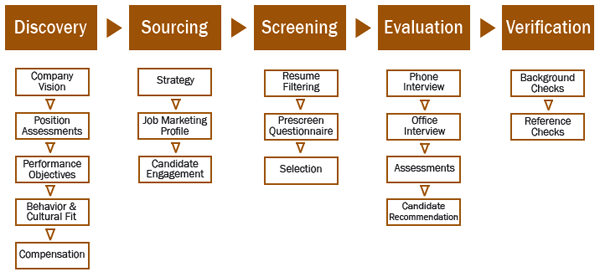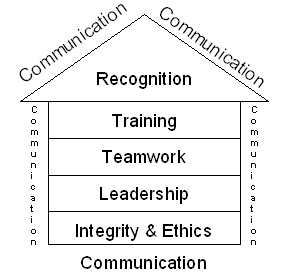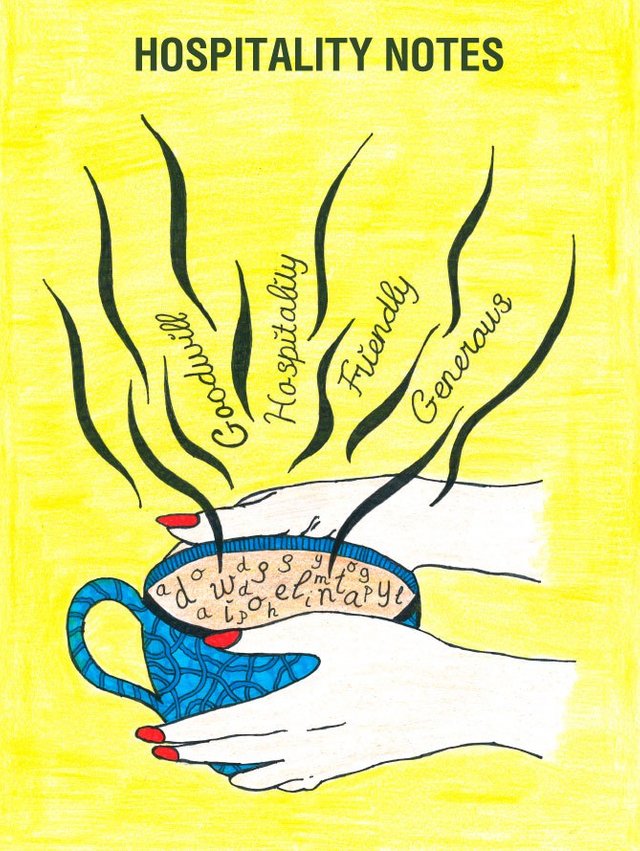HOSPITALITY NOTES part 1 - chapter 3 (Original Non-Fiction + 100% original book cover made on steemit)
In chapter 1, we spoke about what hospitality means in general; and in chapter 2 we spoke about how to handle your staff, understand your guest and how to provide service to them
I promised that an original book cover was in the making right here on steemit, and thanks to @poeticsnake here it is:
Welcome notes
In this chapter, we will discuss the main “gem” hidden within the hospitality field. This gem is not other but the staff working within the field.
Sure, every field of work depends on human resources, but nothing does that, just like the hospitality field. It is the most important source you can have, as all of the work that we build do in hospitality is based on how well staff understand their task; how well they fulfil it and how hospitable they are while doing so.
To slightly generalise things, before breaking them down further, we can say that the effort that the staff puts in their work makes life easier for the guests.
This sentence, if thought out properly, is one of the keys to understanding success in this field.
To make sure that this is fulfilled first of all (and as obvious as it sounds), only consider working with professionals.
Now, what is meant by that? Does it mean that we must hire only staff that has 5 years experience at the least? Or does it mean that we only hire people that have a master’s degree in hospitality?
Well, it means neither. It simply means that companies (and HR offices within them) must spend more time considering staff they hire. They must double check each person hired, and HR managers must understand their own field of work.
One of the biggest problems within the hiring process of any hotel or restaurant is that most of the time the HR managers have no clue about the field that they are hiring into.
The manager that is looking for stuff cannot pass on his requirements in a proper manner to HR. And a misunderstanding occurs between HR and the manager in line.
Well, the first thing that must be done is to only hire HR that has experience working within the hospitality field. That is a must if you want your staff to be able to fulfil the goals that you set for them and stay with you longer than 1 - 3 months.
The next step is to teach managers to be able to pass on requirements to the HR office in a proper manner. Consider tasks lists; consider tables with tick boxes… It doesn’t matter how you will do it. What matters is the result.
The next step is the hiring process itself; often we hurry and don’t consider the main point. Will staff fulfil the tasks that are set to them?
To answer this question staff must be tested, firstly by the HR office and secondly by the manager in line. A simple set of questions, apart from the tests, will show the willingness of the people to work.
More so, a good manager with 3 – 5 years of experience can feel whether a particular person fills the need for the job, but they still hire, even when they feel that the person will not fit, in order to close the gap.
We will discuss in later chapters the hiring process in a much more detailed manner; now let us move on further.

So, you have your staff hired and you are ready to sail away. My first advice to any manager before he begins any training or teaching is to set a personal example!
Be the person you want your staff to become. Do you often break the rules you set yourself? Expect the same rules to be broken by your staff members.
Do you smile and say hello to each member of the staff? Expect your staff to act in the same way towards guests.
Before you dive into creating never endless standards and training for your staff, try to understand them. Listen to their needs.
Hear out what they want; process the information; think how it can be applied within your company.
This process must be done repeatedly over and over again if you are to succeed.
Now is teaching and training the same process? Well, nearly. Teaching requires of us to actually make sure the person we pass on the information to, fully grasps what has been showed to him (the training process).
So when you make any training or S.O.P make sure that you follow on it at least a few times. One follow up come straight after the training (it can be a written test or an oral one), the next one, has to be within 1 – 2 days. The other follow-ups must be on a permanent basis, constantly done by the managers in line until they make sure that the staff fulfils the training 100%.
Even then, follow-ups must be constant, but can be done at the discretion of the manager, as he will know better, which person needs to repeat the training process.
We will discuss basic training examples in later chapters in much more detail. At this point, you must understand the importance that this process carries, and your role in the process.
Without a proper training and a follow-up, teaching loses all its value.
To fully fulfil the process, always remember to notice how successful staff has been. Constantly remind them of their successes (when they take place) in the training process and apply the same strategy to the working process.
It can show in the form of a simple “well done” or it can be applied on a bigger scale with completions and small presents to those that show the best results.
Make sure that each member of staff understands their task, before he is set to work with guests. Staff members have to learn to deal with the cons that they find in their daily routine (this is not including guests complaints, those have to be dealt with in place) and to be able to pass the information onwards in order to solve the issue as soon as possible.

Make sure that you set tasks to all your staff, and that tasks are set further down the whole line of the company hierarchy. This might once again sound an obvious requirement for success, but it is often the middle man that breaks up the “chain”.
Too often we see an ambitious manager or a shift leader, that decided that he can fulfil all the tasks by himself and this is his way of showing his great ability to succeed.
The task is to notice his success and to show him that it is not much easier than that of being able to give the task further on to the correct person.
Making sure each member of the staff has a task; you are making sure that each chain piece is as important as the previous and the next one.
Be sure that you know how to apply quality control. Quality management (as it is often referred to in the hospitality field), means simply reviewing the quality of standards set and how they are fulfilled. Don’t await your ISO checks.
Those tasks have to be set and performed on a daily basis by yourself and the by the managers. More so, going back to spreading tasks, it is something that is done by each member of staff if it has been set correctly.
QC includes inspecting, testing, checking, assuring and so on in every field of the work.
But instead of stopping on productive activities apply total quality management (or total quality control, TQC).
Simply put down, it means to plan, assure, control and improve any single process.
The primary focus has to be on exceeding guests expectations. That means understanding each and current contribution of the process and maximising it. It means being a leader at each level and to be able to engage people in achieving objectives.
Creating a unique organisational structure, in which all resources are used to engage people in order to achieve the policies set. Enhancing creativity and delivering value to the organisation.
Understanding how results are produced by the system and being able to optimise the process. Focusing on constant improvement of those processes. Reacting to any changes and creating new opportunities.
Evaluating data and basing decisions on that data, using the human resources available. Analysing cause and effect processes before taking any decisions further on.

In the final chapter of part 1, we will look at the means of how to keep a guest satisfied and talk about the basic meaning of service.


Well done! I''m waiting to see a doctor now and this story just burned few minutes. Great writing also!
Another gerat post!
VERY good yes! I'm blogging on Steemit about waiting tables, and since I don't have a post today I'm re-steeming this one.
Thank you, hope you found the information useful
I'm enjoying this series. The interesting thing is that almost all of this information can be leveraged outside of your industry. In digital advertising, for example, these hiring practices and especially the ability to appropriately communicate staffing requirements, are what make or break a good team.
I've been in positions where hiring was not well planned, and as a result we ended up with a weak chain link. Keep it coming mate, I'm curious about your opinions on service.
Oh, and I work in TQC basically haha